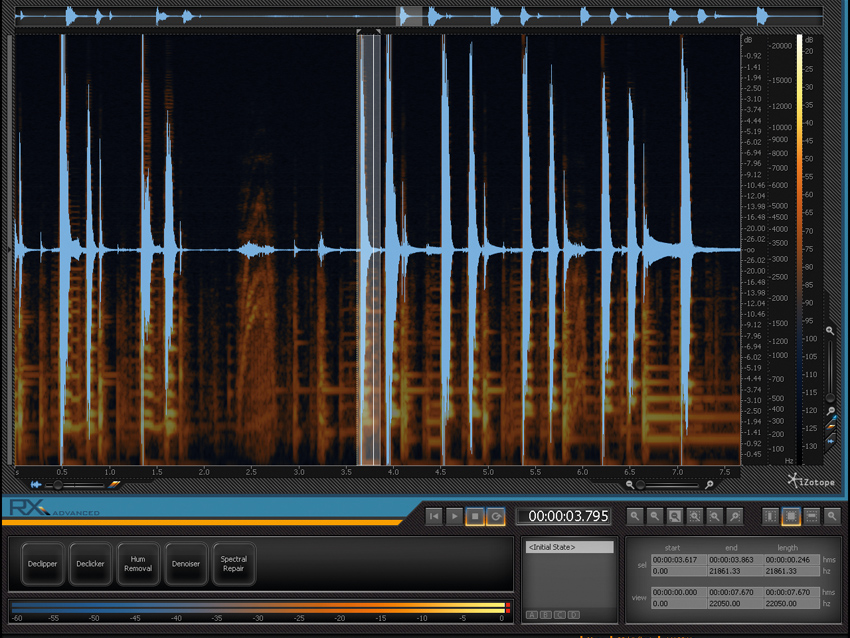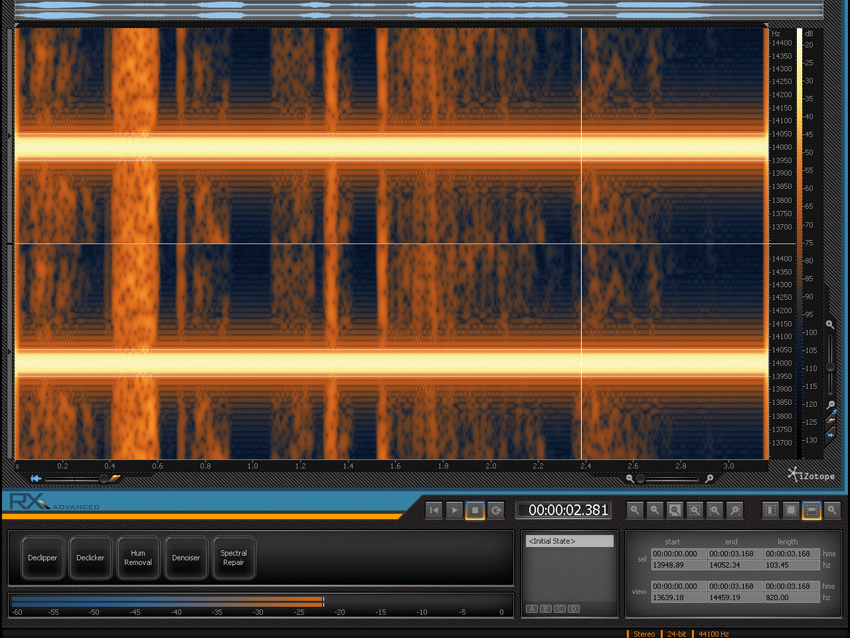MusicRadar Verdict
RX is a thoroughly excellent solution for sound restoration, not to mention an unusually creative tool.
Pros
- +
Innovative approach to restoration. Natural-sounding results. Flexible tools. Easy to use. Huge potential for creative use.
Cons
- -
Big jobs require perseverance
MusicRadar's got your back

iZotope RX

iZotope RX.
There are so many situations in which audio restoration tools can potentially save a less-than-perfect recording, or even be used for more creative purposes. To this end, iZotope has created RX, which is essentially an audio editor dedicated to dealing with the most common symptoms of audio illness: from broadband noise removal to spectral repair and just about everything in between, RX has got it covered.
What's particularly exciting about it, though, is the combination of the novel interface with the pragmatic essence of the individual tools. iZotope claims that RX will restore audio with unparalleled precision, so let's find out how well that lofty claim holds up.
Restoration modules
Right from the off, it's clear that RX is an ambitious piece of software. Each of its dedicated tools has plenty of presets to get started with, and ample controls for when the job requires a finer brush.
The Declipper module can work in both single- and multiband modes, the latter of which can be set from 8 up to 128 bands. It's very easy to use: you just pick from one of three quality levels, then set the clipping threshold. What's more, the results are fantastic.
While not quite miraculous, even with heavily clipped material, RX can produce results that will have you wondering whether the audio was ever really clipped in the first place.
RX's Declicker deals with extraneous pops, crackles and, of course, clicks. It has two modes: automatic and manual. In automatic mode, you can set the interpolation quality, the maximum click width (in milliseconds) and the sensitivity, which determines how keen RX's click-suppression algorithm will be to take action.
It seems to work by analysing the surrounding audio and using that information to replace the click samples with those that fit snugly into the surrounding waveform. And, once again, it works beautifully.
The Hum Removal module is a pretty standard affair, based on a comb-style filter with up to eight harmonics. This means that, once you've selected the base frequency (commonly 50Hz for mains hum in the UK), RX will also apply gain reduction to the harmonics above it, cleanly removing the hum. In our tests, even on bass-heavy material, RX very much walked the walk.
Background noise is perhaps the most common ailment to afflict our audio. RX's Denoiser works just as many others do: you select a section of audio containing just noise, then click Train to create a noise profile.
In simple mode, the only other thing you need do is set reduction and smoothing levels (the latter helps to suppress the washy/watery sounds commonly associated with such processes). As with the other modules, there's also an advanced mode for independent control over broadband and tonal noise types. Both modes have three exciting algorithms (well, as exciting as algorithms can be), including Offline mode.
We tested a 45-minute, 32-bit, mono audio file with the highest noise reduction setting in Offline mode. It took a good couple of hours, but the results were stunning.
Then there's Spectral Repair. This is another interpolation tool which replaces corrupted - or even silent - segments of audio, using the surrounding audio to resynthesize the samples in the waveform.
The results are highly dependent on the source material, and they don't always sound right, but hey, this is, after all, an 'impossible' task. What's more, with the right kind of audio, the results can be highly impressive, and you can get very creative by abusing this module. A built-in compare function means that you can have RX render the selected audio with different settings, then flick between them to determine which you like the sound of best.
The editor
So far we've only looked at the individual restoration modules, but it could easily be said that RX's edge is in its purpose-built editor.
The main window has two visual modes, which you can fade between. The first is the regular waveform view, which we're used to seeing in virtually all wave editors, with amplitude on the vertical axis.
The alternative is the most advanced spectrogram we've ever seen, enabling you to select and isolate any frequency at any specific time for discrete processing. Often, you don't need to use the restoration modules because many tasks can be carried out easily using the main edit window to select (and even solo) the most specific areas, which can then be processed with gain or EQ.
You can also process such selections with the full-blown restoration modules, of course, and with the plug-in versions of RX now available, there's yet more flexibility.
Advanced option
Everything mentioned so far applies to the standard version of RX, but RX Advanced ($1199) is for those who require further control over their audio. It includes iZotope's MBIT+ dithering panel; the 64-bit SRC resampling panel; advanced manual de-clicking; multi-resolution de-clipping; multi-resolution spectral repair modes; and advanced Denoiser parameters, all with a plethora of hardcore options.
The vanilla RX will suffice for most scenarios, and offers good value for money, but the Advanced version could prove essential for those working in pro mastering, or fields such as police investigation, where increased voice intelligibility might save the day.
Hear evidence of RX's greatness by listening to this vocal clip before and after treatment:
Before
After
MusicRadar is the number 1 website for music makers of all kinds, be they guitarists, drummers, keyboard players, djs or producers...
GEAR: We help musicians find the best gear with top-ranking gear round-ups and high- quality, authoritative reviews by a wide team of highly experienced experts.
TIPS: We also provide tuition, from bite-sized tips to advanced work-outs and guidance from recognised musicians and stars.
STARS: We talk to musicians and stars about their creative processes, and the nuts and bolts of their gear and technique. We give fans an insight into the actual craft of music making that no other music website can.
“Built from the same sacred stash of NOS silicon transistors and germanium diodes, giving it the soul – and snarl – of the original”: An octave-fuzz cult classic returns as Jam Pedals resurrects the Octaurus
What’s the buzz? Meet Yellowjacket, Cherry Audio's recreation of EDP’s trend-setting Wasp from 1978
“A fabulous trip through all eight songs by 24 wonderful artists and remixers... way beyond anything I could have hoped for”: Robert Smith announces new Cure remix album










